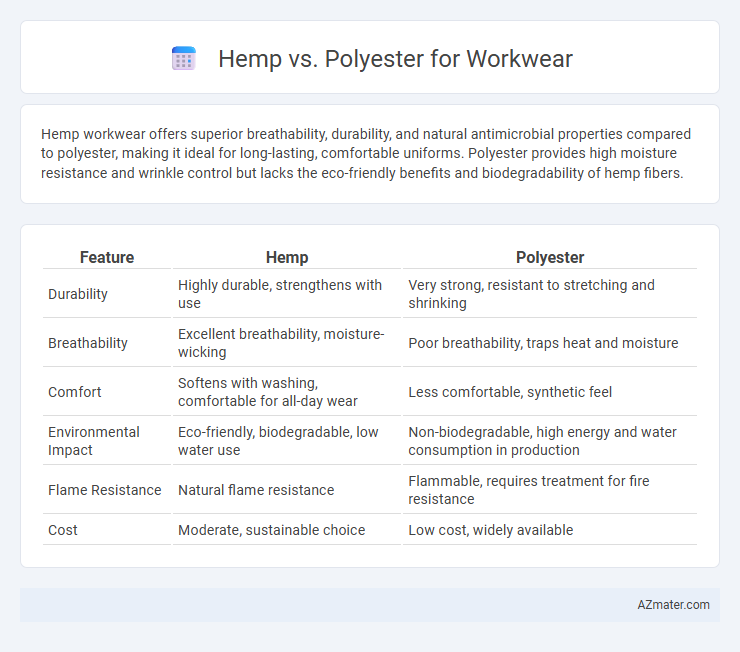Hemp workwear offers superior breathability, durability, and natural antimicrobial properties compared to polyester, making it ideal for long-lasting, comfortable uniforms. Polyester provides high moisture resistance and wrinkle control but lacks the eco-friendly benefits and biodegradability of hemp fibers.
Table of Comparison
| Feature | Hemp | Polyester |
|---|---|---|
| Durability | Highly durable, strengthens with use | Very strong, resistant to stretching and shrinking |
| Breathability | Excellent breathability, moisture-wicking | Poor breathability, traps heat and moisture |
| Comfort | Softens with washing, comfortable for all-day wear | Less comfortable, synthetic feel |
| Environmental Impact | Eco-friendly, biodegradable, low water use | Non-biodegradable, high energy and water consumption in production |
| Flame Resistance | Natural flame resistance | Flammable, requires treatment for fire resistance |
| Cost | Moderate, sustainable choice | Low cost, widely available |
Introduction: The Rise of Sustainable Workwear
Hemp workwear offers unmatched durability and breathability, making it an eco-friendly alternative to conventional polyester fabric, which is derived from non-renewable petroleum sources. The rise of sustainable workwear reflects growing demand for materials with reduced environmental impact, emphasizing natural fiber benefits like biodegradability and moisture-wicking properties. As industries adopt eco-conscious practices, hemp emerges as a superior choice for heavy-duty, long-lasting apparel that also supports sustainable agriculture.
Hemp vs Polyester: Material Overview
Hemp fabric is derived from the natural fibers of the Cannabis sativa plant, offering breathability, durability, and biodegradability, making it an eco-friendly option for workwear. Polyester, a synthetic polymer made from petrochemicals, provides high strength, wrinkle resistance, and moisture-wicking properties but lacks biodegradability and can contribute to microplastic pollution. Hemp's natural antibacterial qualities and environmental benefits contrast with polyester's synthetic resilience and ease of care, influencing material choice based on performance and sustainability priorities.
Durability and Longevity: Which Lasts Longer?
Hemp workwear offers superior durability due to its strong natural fibers that resist stretching, pilling, and tearing over time. Polyester, while highly resistant to shrinking and abrasion, tends to degrade faster with repeated washing and UV exposure compared to hemp. Overall, hemp maintains its structural integrity longer, making it a more sustainable choice for long-lasting workwear.
Comfort and Breathability in the Workplace
Hemp workwear excels in comfort and breathability due to its natural fibers, which allow superior moisture-wicking and airflow compared to synthetic polyester. Polyester, while durable and resistant to wrinkles, tends to trap heat and moisture, potentially causing discomfort during extended wear. Choosing hemp enhances workplace comfort by maintaining a cooler, drier environment for the skin, crucial for demanding physical tasks.
Environmental Impact: Eco-Friendliness Compared
Hemp fabric boasts superior eco-friendliness compared to polyester, as it is biodegradable, requires minimal water, and grows rapidly without pesticides. Polyester production relies heavily on non-renewable petroleum resources and generates significant greenhouse gas emissions. Hemp's renewable, sustainable cultivation significantly reduces environmental footprint, making it the greener choice for workwear.
Moisture-Wicking and Temperature Control
Hemp fabric offers superior moisture-wicking properties and excellent temperature regulation due to its natural breathability and ability to absorb moisture without feeling damp. Polyester, while also moisture-wicking, tends to trap heat and may retain odors, making it less effective for prolonged wear in hot or humid environments. Workwear made from hemp provides enhanced comfort and dryness by promoting airflow and rapid evaporation, making it ideal for demanding physical labor.
Maintenance and Care Requirements
Hemp workwear requires minimal maintenance due to its natural resistance to abrasion, stains, and odors, often needing only gentle washing with mild detergents to preserve fabric integrity. Polyester workwear demands frequent washing and careful temperature control during laundering to prevent shrinking, pilling, and loss of moisture-wicking properties. Both fibers benefit from air drying, but hemp's biodegradability and durability offer eco-friendly advantages over the synthetic polyester in long-term care.
Cost Considerations: Upfront and Long-Term
Hemp workwear typically has a higher upfront cost than polyester due to its natural cultivation and processing methods, but it offers superior durability and biodegradability that can reduce replacement frequency and environmental impact over time. Polyester, being synthetic, is generally more affordable initially and provides resistance to stains and wrinkles, yet it tends to wear out faster and contributes to microplastic pollution. Considering long-term cost efficiency, hemp's longevity and eco-friendly properties often result in better overall value despite the premium price.
Workplace Suitability: Industry-Specific Needs
Hemp workwear excels in industries requiring durability, breathability, and natural moisture-wicking, such as construction and agriculture, due to its antimicrobial and hypoallergenic properties. Polyester offers superior resistance to stains, abrasions, and chemical exposure, making it ideal for manufacturing and automotive sectors where heavy-duty protection and easy maintenance are crucial. Choosing between hemp and polyester depends on the specific workplace hazards, environmental conditions, and comfort requirements inherent to each industry.
Conclusion: Choosing the Best Fabric for Workwear
Hemp offers superior durability, breathability, and eco-friendliness, making it ideal for sustainable workwear that withstands tough conditions. Polyester provides excellent moisture-wicking properties, quick drying, and high resistance to abrasion, suitable for high-performance environments. Selecting the best fabric depends on prioritizing sustainability and comfort with hemp or durability and moisture management with polyester.

Infographic: Hemp vs Polyester for Workwear
 azmater.com
azmater.com